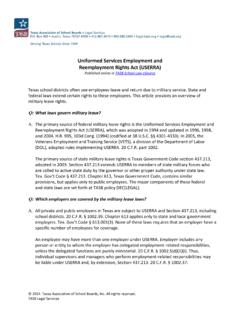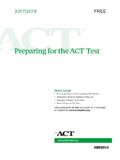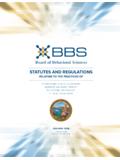Transcription of Opting Out of Standardized Tests February 2022 - TASB
1 Opting Out of Standardized Tests Published online in TASB School Law eSource Many parents, and even many educators, are dismayed by the frequency of and emphasis on Standardized Tests in public schools. When the No Child Left Behind Act (NCLB) was signed into law in 2002, every state prescribed Standardized testing to comply with state plan requirements. School districts' accountability ratings and reputations became intertwined with Standardized test scores. Many felt the emphasis on test scores resulted in an increase in the stress on students, teachers, and administrators and a teach to the test environment.. When NCLB was replaced by the Every Student Succeeds Act (ESSA) in December of 2015, the new law gave states some leeway in how students were assessed and how assessment would factor into school accountability. However, school accountability is still tied to academic achievement, and Texas, by virtue of its current accountability system, still measures academic success on summative Standardized exams.
2 In Texas, parents who object to Standardized testing are publicly discussing the idea of Opting out, either by keeping their children at home on test dates or by permitting them to abstain from testing. These parents have the right to express their opinions, of course. For example, they might file a grievance at the local level, or, even better, express their points of view to state and federal lawmakers who have the power to change testing requirements. However, actually Opting out is not as easy as it sounds, and there are important consequences parents should consider. School officials are tasked with the application of state rules on Opting out, but engaging parents in a more personal dialogue can be an effective compliance tool. The questions and answers below give an overview of the practice of Opting out. 1. What Standardized Tests are required in Texas public schools?
3 Standardized testing is required in Texas public schools by the State of Texas Assessments of Academic Readiness, or STAAR, program set out in Texas Education Code chapter 39 and 19 Texas Administrative Code chapter 101. The Texas Education Agency (TEA) publishes detailed information on their STAAR assessment website. Testing in Grades 3-8: Unless exempt, all students in grades 3-8 take the following STAAR. Tests : Math, annually in grades 3 through 8;. 2022. Texas Association of School Boards, Inc. All rights reserved. TASB Legal Services Page 2. Reading, annually in grades 3 through 8;. Social studies in grade 8;. Science in grades 5 and 8; and Any other subject and grade required by federal law. Tex. Educ. Code (a). Writing: To comply with federal requirements, TEA will integrate writing into the reading assessment in the 2021-22 school year. Tex. Educ. Agency, To the Administrator Addressed Letter Re: Reading Language Arts (RLA) Assessment Transition, Aug.
4 12, 2019. High School End-of-Course Exams: Students must pass five end-of-course (EOC) exams to graduate: Algebra I, Biology, English I (including reading and writing in a single exam), English II (including reading and writing in a single exam), and History. In some instances, performance on certain assessments, including ACT, SAT, and TSI, can be used to satisfy EOC requirements. For more information about EOC substitute assessments, see TEA's Substitute Assessment Standards Chart. Benchmark Testing: A benchmark test is a locally-required assessment instrument designed to prepare students for a corresponding state-administered assessment instrument. A school district may not administer more than two benchmark Tests to prepare students for the related state-administered assessment. Tex. Educ. Code . In addition, a district may not administer locally-required benchmark Tests on more than ten percent of the instructional days in any school year.
5 District campus-level planning and decision-making committees may limit the percentage of instructional days available for benchmark testing to ten percent or less. Tex. Educ. Code Interim Testing: TEA maintains online interim assessments for school districts. These assessments align with the TEKS, include some former STAAR items, and are available at no cost to districts. Interim assessments are optional for school districts and are not tied to accountability ratings. For more information about interim testing, see TEA's STAAR. Interim Assessments website. 2. What does federal law say about Opting out? ESSA, like its predecessor, NCLB, requires districts to measure the achievement of at least 95 percent of all students. Under ESSA, schools that drop below the 95 percent could face consequences from the state. 20 6311(c)(4)(E). 2022. Texas Association of School Boards, Inc.
6 All rights reserved. TASB Legal Services Page 3. Contrary to statements on some anti-testing websites, ESSA does not include a federal right to opt out of Standardized assessments. These websites are likely referring to a provision in ESSA that requires districts to provide information to parents regarding the assessment, which may include, where applicable, the district's opt-out policy. As described below, an opt-out policy is not applicable in Texas, therefore school districts in Texas do not need to provide parents with information on an opt-out policy. Districts must, however, provide parents with information regarding their children's participation in the assessment. 20 6312(e)(2). 3. Is there a right to opt out of Standardized Tests in Texas public schools? No, in fact just the opposite. State law makes it clear that students may not opt out of Standardized or any other Tests .
7 Texas Education Code section states the following: EXEMPTION FROM INSTRUCTION. (a) A parent is entitled to remove the parent's child temporarily from a class or other school activity that conflicts with the parent's religious or moral beliefs if the parent presents or delivers to the teacher of the parent's child a written statement authorizing the removal of the child from the class or other school activity. A parent is not entitled to remove the parent's child from a class or other school activity to avoid a test or to prevent the child from taking a subject for an entire semester. (b) This section does not exempt a child from satisfying grade level or graduation requirements in a manner acceptable to the school district and the agency. (emphasis added). 4. What are the consequences of missing school on a testing date? Makeup Tests : First, it is important to note that missing school on a single designated test date will not necessarily cause a student to miss the testing opportunity.
8 Although districts publish a schedule of specific test dates for STAAR, most Tests are administered within a testing window set by TEA. If a student who has been absent returns to school during the testing window, the student may be asked to sit for the exam at that time. Makeup test dates are also scheduled (beyond the window) for most assessments. Compulsory Attendance: Depending on the circumstances, a student may be subject to truancy prevention measures and a parent may commit the offense of contributing to nonattendance, if the student fails to attend school on 10 or more days or parts of days within a six-month period in the same school year or on three or more days or parts of days within a four-week period. Tex. Educ. Code ; Tex. Fam. Code 2022. Texas Association of School Boards, Inc. All rights reserved. TASB Legal Services Page 4. By law, a school district is required to notify a student's parent and seek a conference if the student has been absent from school without excuse on three days or parts of days within a four-week period.
9 The notice must inform the parent of the following: It is the parent's duty to monitor the student's school attendance and require the student to attend school, and The student is subject to truancy prevention measures. Tex. Educ. Code Like the state testing requirements, notice and enforcement of attendance laws are not optional for school districts. Attendance for Credit: Failure to attend on a test date or during a testing window would also be taken into consideration for the purposes of the 90 percent attendance rule. A. student in any grade K-12 may not receive credit or a final grade if the student attends class less than 90 percent of the days the class is offered, absent extenuating circumstances as determined by a local attendance committee or, in some cases, the campus principal in accordance with board policy. Tex. Educ. Code 5. What about being present but not testing?
10 All eligible students present at school on a test date must be included in the test administration. Campus officials must submit a score code for every student, in accordance with TEA test administration guidelines. Questions have arisen about whether a campus could allow a student who is present at school, but whose parent has indicated a desire to opt out of the test, to go to a supervised location other than the testing site to complete other schoolwork. School officials considering offering this option should consult with the district's school attorney. At a minimum, the district should clarify for parents that waiting in an alternative location is not truly Opting out. A test must be submitted and scored on behalf of the student, which might result in academic consequences for the student. In addition, the campus is obligated to maintain a secure test environment throughout the test administration in accordance with TEA test security requirements.








